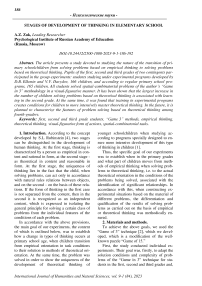Stages of development of thinking in elementary school
Автор: Zak A.Z.
Журнал: Международный журнал гуманитарных и естественных наук @intjournal
Рубрика: Психологические науки
Статья в выпуске: 9-1 (84), 2023 года.
Бесплатный доступ
The article presents a study devoted to studying the nature of the transition of primary schoolchildren from solving problems based on empirical thinking to solving problems based on theoretical thinking. Pupils of the first, second and third grades of two contingents participated in the group experiments: students studying under experimental programs developed by D.B. Elkonin and V.V. Davydov, 166 children, and according to regular primary school programs, 165 children. All students solved spatial-combinatorial problems of the author’s “Game in 3” methodology in a visual-figurative manner. It has been shown that the largest increase in the number of children solving problems based on theoretical thinking is associated with learning in the second grade. At the same time, it was found that training in experimental programs creates conditions for children to more intensively master theoretical thinking. In the future, it is planned to characterize the features of problem solving based on theoretical thinking among fourth-graders.
First, second and third grade students, “game 3” methods, empirical thinking, theoretical thinking, visual-figurative form of actions, spatial-combinatorial tasks
Короткий адрес: https://sciup.org/170200360
IDR: 170200360 | DOI: 10.24412/2500-1000-2023-9-1-186-192
Список литературы Stages of development of thinking in elementary school
- Davydov V.V. Problems of developing education. - Moscow: Academya, 2004. - 452 p. [In Russian].
- Zak A.Z. Thinking of a junior schoolchild. - St. Petersburg: Assistance, 2004. - 828 p. [In Russian].
- Elkonin D. B. Selected psychological works. - Moscow: Pedagogika, 1989. - 560 p. [In Russian].
- Rubinstein S. L. Fundamentals of general psychology. - St. Petersburg: Peter, 2019. - 720 p. [In Russian].


